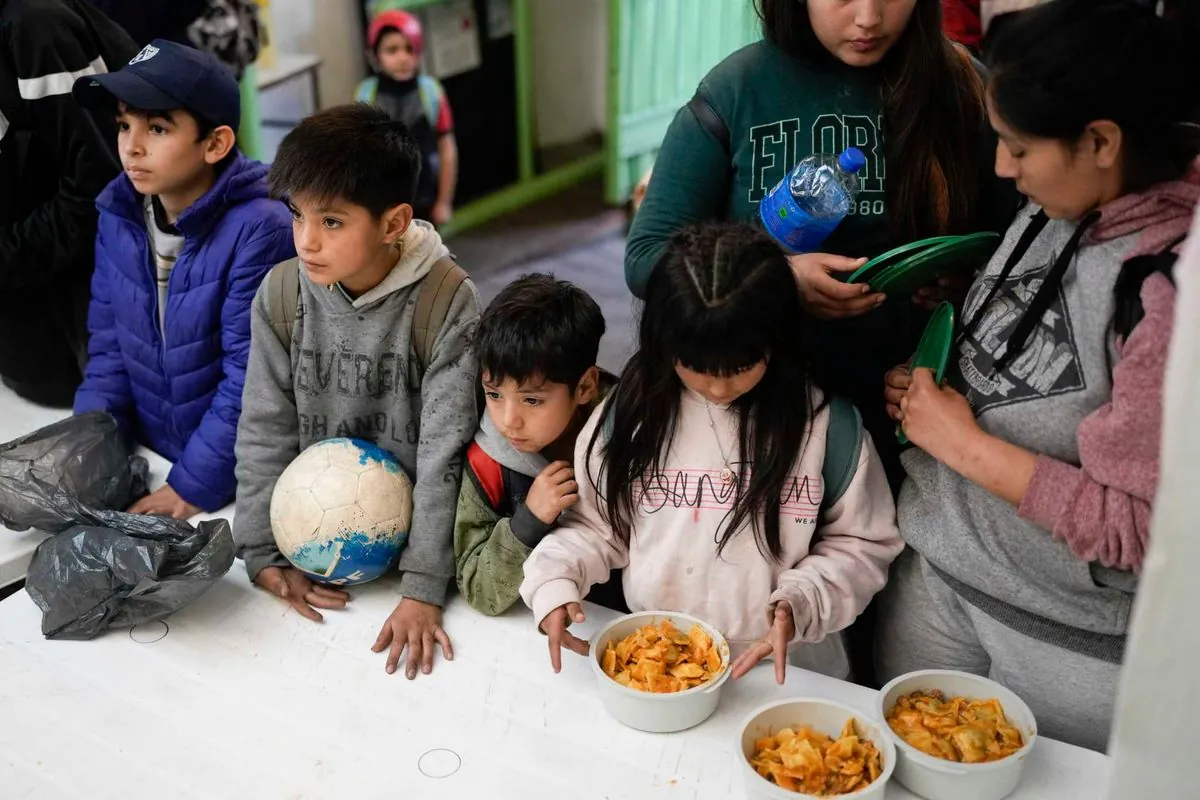Argentina's Food Crisis Deepens as Austerity Measures Take Toll
Argentina faces a growing food emergency as poverty rises and malnutrition-related diseases increase. President Milei's austerity measures exacerbate the situation, with aid groups criticizing cuts to social programs.

Argentina, once one of the world's richest nations, is grappling with a severe food crisis that has left over half its population in poverty. This South American country, known for its vast landscapes and rich cultural heritage, is now witnessing a stark increase in malnutrition-related diseases, including scurvy and eye injuries due to vitamin deficiencies.
The situation has worsened since President Javier Milei took office in December 2023, implementing stringent austerity measures as part of a "zero deficit" plan to stabilize the economy. These cuts have significantly impacted social programs, including funding for soup kitchens, which play a crucial role in feeding the nation's poorest.
Recent data reveals that poverty hit 53% in the first half of 2024, up from 42% at the end of 2023. More alarmingly, 18% of Argentinians now live in extreme poverty, unable to afford even basic food necessities. This crisis is particularly affecting children, with seven out of ten living below the poverty line.

The food insecurity situation in Argentina has nearly doubled over the past seven years, reaching 36% of the population experiencing moderate-to-severe food insecurity. This trend is especially concerning in a country that has traditionally prided itself on its beef-rich diet and agricultural abundance.
Medical professionals are reporting an increase in diseases linked to malnutrition. Dr. Norma Piazza, a pediatrician specializing in nutrition, states:
"We are seeing cases of scurvy, cases of eye injuries due to Vitamin A deficiency, with corneal injuries. These things existed in Central America, Africa, Asia, but we had never seen patients here who had eye lesions due to a lack of vitamin A."
[[Dr. Norma Piazza, Pediatrician specializing in nutrition]]
The government has acknowledged the "food emergency" and claims to have responded by increasing certain welfare subsidies. However, aid groups and religious organizations criticize the cuts to community kitchens, arguing that these measures are exacerbating the crisis.
Argentina's current predicament is a stark contrast to its historical position. The country was once a major economic power, ranking among the world's wealthiest nations in the early 20th century. However, a series of economic crises, including hyperinflation in the late 1980s and the severe economic collapse of 2001-2002, have contributed to its current struggles.
Despite these challenges, Argentina maintains a high literacy rate of about 98% and a universal healthcare system. The country also boasts the highest number of psychologists per capita globally, reflecting a strong emphasis on mental health. However, these achievements are now overshadowed by the pressing need to address food insecurity and malnutrition.
The long-term consequences of this crisis could be severe. Nutritionists warn that diets lacking essential nutrients can lead to stunted growth and increased susceptibility to diseases. The situation is particularly dire for children, with 10% of those under five already malnourished.
As Argentina continues to navigate this crisis, the world watches closely. The country that has given the world tango, produced numerous Nobel Prize winners, and achieved significant sporting success, including three FIFA World Cup victories, now faces one of its greatest challenges: ensuring its citizens have access to adequate nutrition.


































